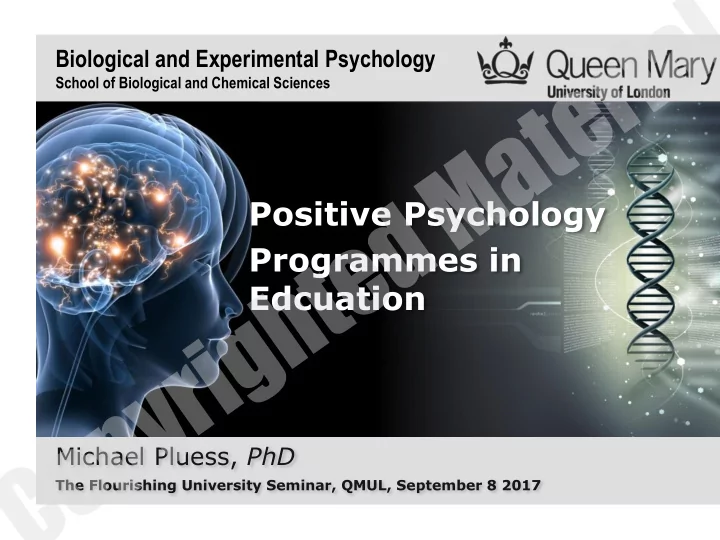

Biological and Experimental Psychology School of Biological and Chemical Sciences Positive Psychology Programmes in Edcuation Michael Pluess, PhD The Flourishing University Seminar, QMUL, September 8 2017
Positive Psychology Interventions London, 08.09.2017 School-Based Programmes Penn Resiliency Program (PRP) • School-based universal prevention programme • For 11-13 year old children • 12 session (90min) CBT (ABC, automatic thoughts, thinking styles) Interpersonal problem-solving (assertiveness, negotiation) Coping strategies (relaxation, controlled breathing) Social Skills Decision making • Efficacy : Meta-analysis of 17 controlled studies (Brunwasser et al., 2009) Slide 2
Positive Psychology Interventions London, 08.09.2017 School-Based Programmes Positive Psychology Curriculum • 20-25 80-minute sessions over the 9th grade year • Targeting strengths, promotion of resilience, positive emotion and sense of meaning or purpose • Results (Seligman et al., 2009): Slide 3
Positive Psychology Interventions London, 08.09.2017 Three Good Things Instruction • “Each day before going to sleep, write down three things that went well during the day and why you think they happened.” https://youtu.be/ZOGAp9dw8Ac Slide 4
Positive Psychology Interventions London, 08.09.2017 Three Good Things Empirical Evidence (Seligman et al., 2005) • “Three Good Things “ Exercise „Write down daily three good things that happened each day for a week“ Why did this good thing happen? What does this mean for you? How can you have more of this good thing in the future? Slide 5
Positive Psychology Interventions London, 08.09.2017 SPARK Resilience Programme SPARK Resilience Programme is a new school-based resilience-promoting programme • Developed specifically for 10-12 year old children from deprived urban communities in England (Boniwell & Ryan, 2009) • Aimed at promoting resilience and preventing depression • Based on concepts of positive psychology and cognitive- behavioural therapy • Delivered by trained teachers in 12 hourly session Study • Testing for both reduction of depression symptoms and promotion of resilience in girls from deprived area in London Pluess M, Boniwell I, Hefferon K, & Tunariu A (2017) Preliminary evaluation of a school-based resilience-promoting intervention in a high-risk population: Application of an exploratory two-cohort treatment/control design. PLoS One 12(5):e0177191. Slide 6
Positive Psychology Interventions London, 08.09.2017 SPARK Resilience Programme Resilience Scores d = .57** d = .75** d = .29** Linear slope: B = 9.64, p = .09 Quadratic slope: B = 10.20, p = .04 Cubic slope: B = 2.46, p = .03 Slide 7
Positive Psychology Interventions London, 08.09.2017 SPARK Resilience Programme Depression Symptoms d = .45** d = .23** Linear slope: B = 1.21, p = .11 Quadratic slope: B = .47, p = .04 Slide 8
Positive Psychology Interventions London, 08.09.2017 SPARK Resilience Programme Qualitative Findings • Thematic analysis of the focus group with six teachers led to the identification of three overarching main themes, indicating that the programme was experienced as a successful and beneficial intervention: Emotional Toolkit Students were able to pick up the concepts of SPARK in order to develop life skills Empathetic Camaraderie SPARK strengthened the relational communication between students and teachers. It also positively influences the school’s general culture with a sense of emphatic camaraderie Teacher and School as Key to Success Teachers recognised the importance of being confident with the programme content and making it interactive Slide 9
Biological and Experimental Psychology School of Biological and Chemical Sciences the End Thank you for your attention! Dr Michael Pluess, Ph.D. Biological and Experimental Psychology School of Biological and Chemical Sciences Queen Mary University of London G.E. Fogg Building, Office 2.01 Mile End Road London E1 4NS United Kingdom Email: m.pluess@qmul.ac.uk Website: www.michaelpluess.com
Recommend
More recommend